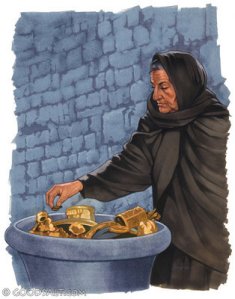THE MIGHTY WIDOW
(A biblical refection on THE 32nd SUNDAY IN ORDINARY TIME – 11 November, 2012)
First Reading: 1Kings 17:10-16; Psalms: Ps 146:7-10; Second Reading: Heb 9:24-28; Gospel Reading: Mk 12:38-44
Prosecution. Hugo Black, US politician and Supreme Court justice, was attending the funeral of a dignitary whom he had heartily disliked and whose funeral he would have happily avoided had it not been expected of him. The service began with the invocation of God’s blessing on the deceased with so many gifts throughout his distinguished life. While this was happening, another judge, arriving late, tiptoed into his place next to Justice Black and whispered, “How far has the service got?” Black whispered back, “They have just opened for the defence.”
The dignitaries in today’s Gospel need more than a defence counsel, for Jesus is putting His case for the prosecution. The scribes were expert lawyers, who interpreted and applied the written Law through a complicated system of traditions. They were respected teachers, both in the schools and in the courts, and had become accustomed to the honor shown them by the ordinary people. Many of them were devoted and selfless scholars, anxious to save people from transgressing the Law; others were ambitious for their own advancement, anxious only for their vanity to be satisfied. It is the latter group that Jesus confronts in today’s Gospel. He reverses the roles: the lawyers become the accused.
Jesus makes a series of charges against the scribes. He criticizes their habit of wearing distinctive dress, which marks them as different from others and is calculated to win people’s deference. He criticizes their habit of taking the places of honor at religious and civil functions. He criticizes their habit of long-winded prayers, made not to God but to their immediate audience. Finally, He denounces their practice of exploiting helpless widows by living off their savings. Jesus says that religious leaders who behave like this will face a more severe sentence than the sinners they readily condemn.
The mighty widow. In contrast to the counterfeit piety of the scribes, Jesus honors true pity in the generosity of the poor widow. The pious frauds who abused their religious status by devouring the property of widows could take a lesson from a woman who had no status in religion or society, a poor widow.
The scene is set in the Temple area. Around the walls of the court of women there were thirteen collecting boxes, known from their shape as trumpets. They were set up for people’s contributions towards the costs of the sacrifices and running expenses of the Temple. Many rich people put in large sums of money – some, no doubt, trumpeting the size of their contribution. A poor widow puts in two of the smallest coins on circulation. In the arithmetic of the Kingdom the widow’s offering is worth more than all the other contributions. Whereas the others give from their surplus, she gives everything.
The two small coins make up the total of her resources. She could have kept one. She doesn’t. Her reckless generosity cannot be bettered. For Jesus, true generosity is measured not by what people give but by what they have left after they give. The poor widow leaves herself with nothing. She cannot give more, for she has nothing more to give. In Jesus’ estimation she is a mighty widow.
Real pity. The story of the widow’s generosity is well placed at this stage in Mark’s Gospel. The poor widow typifies what Jesus will do Himself – give everything as an offering to God. When Jesus is finished giving, their will be nothing left for Him to give. He gives His all. That is the reality of His piety.
Jesus hopes that His own disciples will take their cue from that example of real piety, not from the scribes hungry for status and honor. He hopes that we, His followers, will be equally generous with our own resources. Those resources are not always measured in money. We are called on to give of our time, our talent, our understanding. We are asked to give not just from our abundance but from our substance. That kind of giving always hurts, because we feel all spent after it. Like the widow, we might feel that we have nothing more to give; but it’s that kind of giving that counts with Jesus.
Every day demands are made on us. We are called on to be generous with our love, our forgiveness, our patience, our resources. And the Good News is that when we do that out of love, Jesus will be our constant support. No matter who the prosecuting counsel turns out to be when our case comes up, Jesus will be leading for the defense.
Note: Taken from Fr. Denis McBride CSsR, SEASONS OF THE WORD – Reflections on the Sunday Readings, Chawton, Alton, Hants.: Redemptorist Publications

